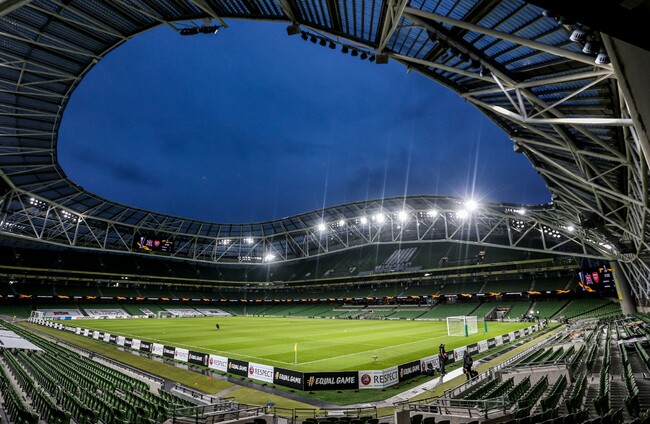UEFA HAVE EARMARKED 7 April as the deadline by which host cities of the delayed European championships must deliver plans to host their games with fans present or risk losing games entirely.
Euro 2020 – postponed to June 2021 owing to the pandemic – is slated to be staged in 12 cities across Europe, with Dublin set to host three group games along with one last-16 knockout tie.
Stephen Kenny’s Republic of Ireland side are uninvolved having failed to qualify, with the Group E games between Poland and Slovakia, Sweden and Slovakia, and Sweden and Poland fixed for Dublin along with a last-16 tie likely to involve England.
While Uefa have affirmed their commitment to sticking with the 12-city format, host cities have been told they must stage games with supporters present to hold on to their games.
Each city’s organising committee have been told to work alongside their local public health authorities and submit a range of capacity scenarios to Uefa by 7 April, from which point the governing body will make a final decision on how to press ahead with the format.
The European governing body upped the ante on a call with the 12 host associations last week, in which they said they want to deliver an average of 50% capacity across the entire tournament.
Sources indicated to Dublin may retain its games with an Aviva Stadium capacity as low as 25% (13,000 people), and FAI CEO Jonathan Hill said last week that Uefa approve of the crowd consisting solely of locally-based fans.
The FAI remain in dialogue with the government and NPHET on the matter ahead of the 7 April submission deadline, and the Association are pressing ahead with their plans to host games as normal, with a meeting with a group of tournament volunteers going ahead as planned later this week.
Though no final decision has been made by Uefa, there is growing speculation that Dublin will ultimately lose their games given the level of ongoing Covid-19 restrictions here. The nationwide Level Five Covid response has been extended to 5 April, with few substantial relaxations expected until at least May.
It is only at Level One of the government’s plan that the Aviva Stadium could host a capacity consistent with Uefa’s expectations for the tournament.
“The public health advice is that it is too early to say how and when these restrictions should be eased given current uncertainties”, an Irish government statement read.
“At the request of Uefa, Dublin’s hosting partners are examining possible scenarios for staging the games scheduled for Dublin in this Covid-19 environment. We are in constant dialogue with Uefa and our intention is to work to finalise our best possible scenario consistent with public health guidelines.”
The Associated Press (AP) today quoted an unnamed Uefa source claiming Dublin was one of three cities at risk of losing games, along with Glasgow and Bilbao. In response to that revelation, however, Uefa have stated they remain committed to the 12-city model.
If Dublin’s games are moved, the AP report stadia in England – Anfield and Old Trafford among them – will be considered as alternative stages.
Today marks 100 days before the rescheduled 11 June start of the tournament in Rome, though at the moment 7 April is the far more significant date.












An absolute barbaric sport.
@Stuart Dickens: More brain damage form boxing so i’d take MMA ahead of it by a mile. Much more safer than repeated shots to he head for 36 minutes.
@Tomás O’Loughlin: look up the definition of sport. This fits exactly into it.
@Tomás O’Loughlin: Sport : an activity involving physical exertion and skill in which an individual or team competes against another or others for entertainment. – doesn’t mention anything of class level of competitors ??
@Stuart Dickens: so don’t watch it ya clown
@Shane Murphy: I won’t you clown.
@Stuart Dickens: but you just did
@Gareth: Only to voice an opinion. 90% of people in Ireland didn’t know what it was until Conor mcgregor showed up. And numbers will drop again when he retires.
@Stuart Dickens: well that’s not true
What a shame.. fights that end so quickly are not always an accurate reflection on the ability of the loosing fighter… could go very different in a rematch. Such is the fight game..